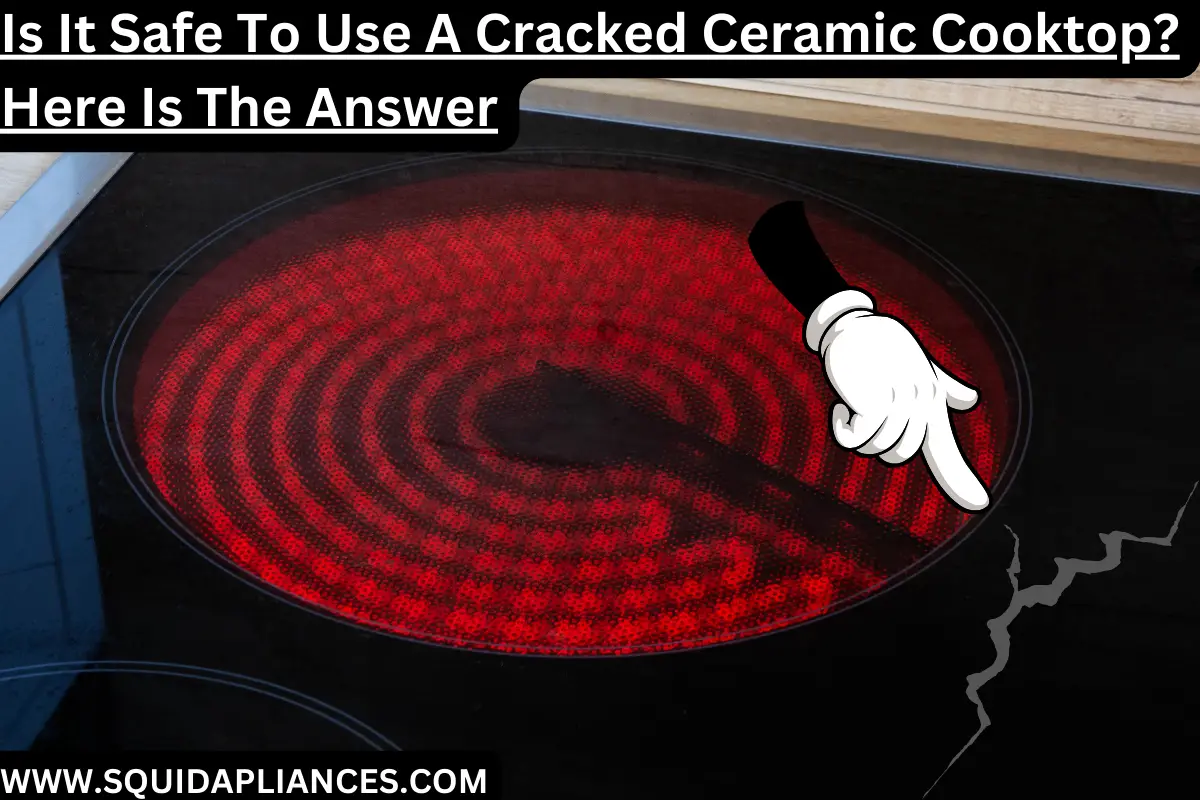Like walking on a tightrope, using a cracked ceramic cooktop can be a precarious situation. I’ve done some digging to answer the burning question: is it safe to use?
A ceramic cooktop, with its sleek design and efficient heat transfer, is a beloved kitchen companion for many.
However, cracks can appear over time due to various reasons – from accidental drops to drastic temperature shifts. And here’s where things get dicey.
There are potential risks associated with continuing to cook on these fractured surfaces that aren’t just limited to poor performance but could also lead us down the dangerous path of electrical shocks or even fires.
So should you repair it or toss it out completely? The answer may not be as straightforward as you’d hope. But don’t worry! I’m also sharing some handy tips on preventing such damage in the future because let’s face it – nobody wants their cooking prowess marred by faulty equipment!
Is It Safe To Use A Cracked Ceramic Cooktop? Here Is The Answer
Using a cracked ceramic cooktop is not safe. Cracks pose burn and electrical hazards, increasing the risk of burns during cooking and potential electrical shorts or fires. The extent of damage determines whether to repair or replace it. Prevent damage with proper use, maintenance, and safety precautions.
Key Takeaways
- Cracked ceramic cooktops can be dangerous and pose risks of electrical shocks and fires.
- Using a cracked cooktop is not safe due to burn hazards and electrical hazards.
- Cracks in cooktops can be caused by impact damage or thermal stress.
- Repairing or replacing a cracked cooktop depends on the extent of the damage.
Understanding Ceramic Cooktops
You’ve likely heard about ceramic cooktops, but do you truly understand what they’re all about? They’re made from a toughened glass-ceramic material, creating an elegant and seamless look in your kitchen.
Among Ceramic Cooktop Advantages are easy maintenance, energy efficiency, and quick heat up times. However, a Cooktop Material Comparison reveals that they can be delicate – drops or knocks could potentially crack the surface.
Reasons for Cooktop Cracking
As we delve deeper into the topic of ceramic cooktops, it’s crucial to understand the reasons behind their cracking. Two primary culprits are impact damage and thermal stress.
Impact damage is usually a result of something heavy falling on the cooktop, while thermal stress occurs due to rapid temperature changes which can affect the structural integrity of the ceramic material.
Impact Damage
When your ceramic cooktop suffers impact damage, it’s like a spider web creeping across your kitchen’s heart, posing safety risks that can’t be ignored. The shattering of trust as the very core of home-cooking is compromised.
Facing the arduous task of damage assessment. Realizing the perceived impact resistance was indeed fallible. Dealing with potential electrical hazards. The looming expense and inconvenience of repairs or replacements.
These are heavy burdens for any homeowner to bear.
Thermal Stress
Yet, even without the sudden shock of impact, your beloved kitchen centerpiece is not exempt from danger; thermal stress is an insidious foe that can inflict just as much damage. It’s a silent killer that chips away at the structural integrity of your ceramic cooktop by affecting its heat distribution.
| Factors contributing to Thermal Stress | Effects |
|---|---|
| Rapid Heating and Cooling | Cracks |
| Uneven Heat Distribution | Warping |
It’s clear – using a cracked cooktop isn’t safe.
Potential Risks of Using a Cracked Cooktop
As we delve into the potential risks of using a cracked cooktop, two major concerns immediately emerge: burn hazards and electrical hazards. The cracks could expose heated elements directly to users, increasing the risk of burns during cooking.
Additionally, if water or other liquids seep through these fractures, they may cause electrical shorts that could lead to shocks or even fires.
Burn Hazards
Sure, you might think a small crack in your ceramic cooktop is no big deal, but wait till it turns into an unexpected burn hazard. Cracks can heat unevenly or create hot spots that could lead to burns. Consider these cooking alternatives and burn treatment options:
| Cooking Alternatives | Burn Treatment |
|---|---|
| Induction Cooktops | Cold Water |
| Gas Stoves | Burn Ointment |
| Electric Grills | Aloe Vera |
| Microwave | Medical Help |
Remember, safety should always come first!
Electrical Hazards
Electrical hazards, often overlooked, can present a real danger if your kitchen appliances aren’t properly maintained or are misused. A cracked ceramic cooktop not only increases the risk of electrical fires but poses a serious shock risk too.
The crack might expose electric components and wiring, leading to short circuits or arcing. It’s no exaggeration to say that using such an appliance can literally be shocking!
When to Repair or Replace a Cracked Cooktop
You’ve got to know when it’s time to repair or replace your cracked ceramic cooktop, just like in the case of Mrs. Anderson who ignored the minor cracks on her cooktop. This led to a major mishap that cost her not only a new stove but also extensive kitchen repairs.
Be mindful of warranty implications and potential insurance claims when dealing with such issues. Don’t delay this crucial decision!
Tips for Preventing Cooktop Damage
Having discussed when to repair or replace a cracked cooktop, let’s now delve into the practical measures you can take to prevent such damage from occurring in the first place. The key lies in proper use and diligent maintenance of your cooking appliance, coupled with stringent safety precautions.
These are vital steps in not just ensuring longevity of your cooktop but also preventing potential accidents that might result from neglect or misuse.
Proper Use and Maintenance
Cracking the code on proper use and maintenance can significantly extend the life of your ceramic cooktop, even when a crack appears! Fostering discipline in cleaning techniques and understanding your warranty coverage are crucial factors.
| Emotional Appeal | Practical Steps |
|---|---|
| Empowerment – You can take control | Regularly clean with approved products |
| Relief – A secured investment | Understand your warranty’s terms |
Remember, safety should always be prioritized over saving money.
Safety Precautions
Let’s not forget, taking precautions can often mean the difference between a minor incident and a major catastrophe.
For instance, imagine you’re hosting a much-anticipated family gathering; your kitchen is bustling with activity when suddenly there’s an alarming pop from your stove – it’s overheated due to improper handling and everyone panics!
This could have been easily avoided by adhering to safety guidelines and incorporating childproofing techniques for accident prevention.
Frequently Asked Questions
What are the cost implications of repairing a cracked ceramic cooktop versus replacing it?
Repairing a cracked ceramic cooktop can be costly, especially without warranty coverage. Insurance claims may help, but it’s often more economical to replace it entirely due to the high cost of parts and labor.
Can cracked ceramic cooktops affect the efficiency of the cooking process?
Using crack detection techniques, I’ve found that cracked ceramic cooktops can indeed affect cooking efficiency. The damage impacts energy consumption, as heat leaks from the cracks, reducing the cooktop’s overall performance.
Are there any particular types of cookware that are less likely to damage a ceramic cooktop?
Drawing from my experience, cookware material impacts ceramic cooktop maintenance greatly. Flat-bottomed pans, preferably stainless steel or titanium are less likely to scratch or damage your precious ceramic cooktop.
What are some common misconceptions about using a cracked ceramic cooktop?
Some folks think crack causes won’t affect a cooktop’s performance. They’re mistaken. A small fissure can grow, leading to potential harm. Also, many assume warranty coverage includes cracks, but that’s often not the case.
Can a cracked ceramic cooktop pose any risks to the food being prepared?
Just as I was researching, I found that a cracked ceramic cooktop can indeed pose health hazards. Tiny ceramic particles might mix with your food if safety measures aren’t taken to fix or replace the cooktop.
Conclusion
After researching and understanding the risks, I’ve concluded that using a cracked ceramic cooktop isn’t safe. It poses electrical hazards and can lead to further damage or even injury.
It’s best to repair or replace it promptly. Remember, prevention is key; simple steps like careful handling and regular maintenance can keep your cooktop in top shape!






